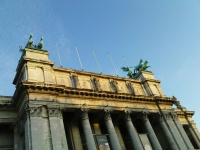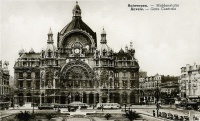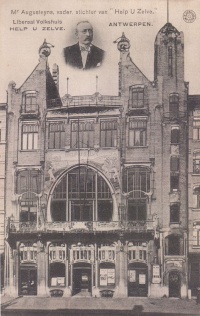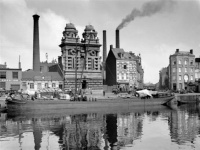Architecture of Belgium
From The Art and Popular Culture Encyclopedia
| Revision as of 00:45, 16 January 2023 Jahsonic (Talk | contribs) ← Previous diff |
Revision as of 18:49, 8 October 2023 Jahsonic (Talk | contribs) Next diff → |
||
| Line 25: | Line 25: | ||
| ==Twentieth century== | ==Twentieth century== | ||
| - | *[[Renaat Braem]], [[Juliaan Lampens]], [[Léon Stynen]]. | + | *[[Renaat Braem]], [[Juliaan Lampens]], [[Léon Stynen]], [[Marcel Raeymakers]]. |
| *[[Beaux-Arts architecture in Belgium ]] | *[[Beaux-Arts architecture in Belgium ]] | ||
| *[[Monumental architecture in Belgium ]] | *[[Monumental architecture in Belgium ]] | ||
Revision as of 18:49, 8 October 2023
|
Canonical: Victor Horta, Renaat Braem, Jacques Moeschal |
|
Related e |
|
Featured: |
Examples of Belgian architecture include the Prince-Bishopric of Liège (980s) the Collegiate Church of Saint Gertrude, Nivelles (1046), the Tournai Cathedral and the 15th-century Cathedral of Our Lady in Antwerp and, as well as the Brussels Grand Place.
In Antwerp there is the Antwerp City Hall (1565), the Royal Museum of Fine Arts (1890) and the Antwerpen-Centraal railway station (1905).
Famous Art Nouveau architects Victor Horta (Musée des Beaux-Arts, Tournai, 1928) and Henry van de Velde (Boekentoren, ) influenced early 20th-century architecture in Belgium and abroad.
In Ghent there is the City Pavilion (2012), in Brussels the Atomium (1958) and in Liège the Liège-Guillemins railway station (2009).
Contents |
18th century
19th century
Twentieth century
- Renaat Braem, Juliaan Lampens, Léon Stynen, Marcel Raeymakers.
- Beaux-Arts architecture in Belgium
- Monumental architecture in Belgium
- Art Deco architecture in Belgium
- Modernist architecture in Belgium
See also
- Belgian brutalism
- Belgian tourism
- Belgian culture
- List of Belgian architects
- Archibelge (2015), a television documentary on ugly Belgian architecture
- Architecture of the Netherlands
- Lintbebouwing
- Ugly Belgian Houses
- Fermette
- Toerist Modernist
- "The Ugliest Country in the World" (1968), a book-length essay by Renaat Braem
- Plannen voor plaats (2018), a documentary by Nic Balthazar and Leo Van Broeck
- Jacques Moeschal
.JPG)





